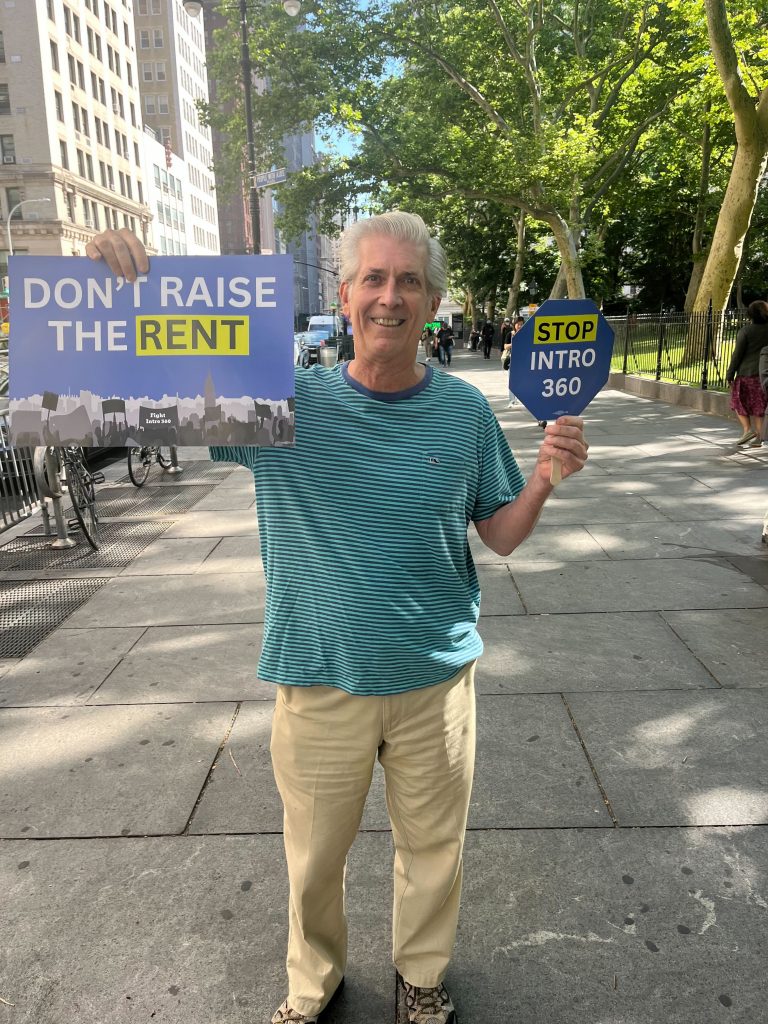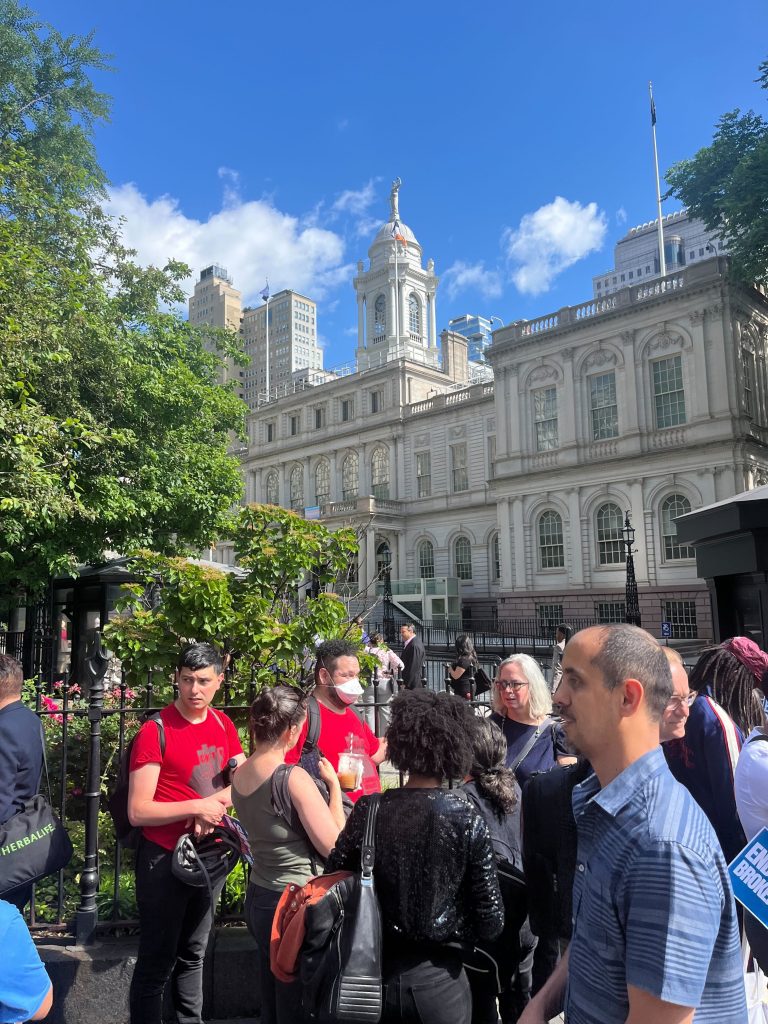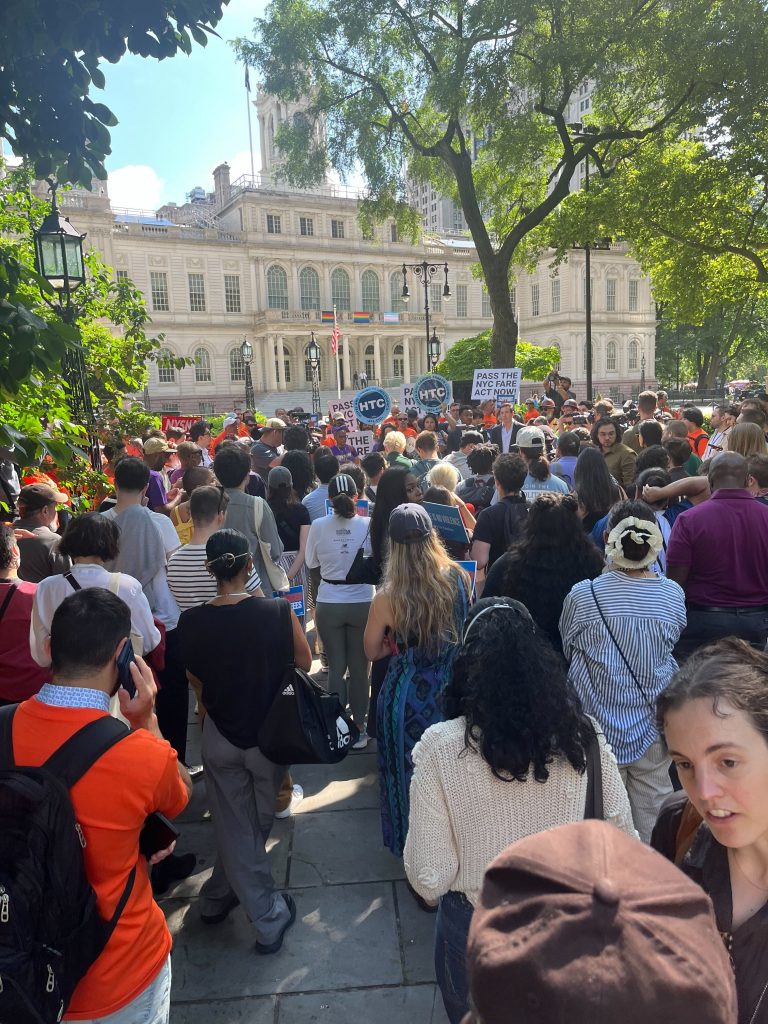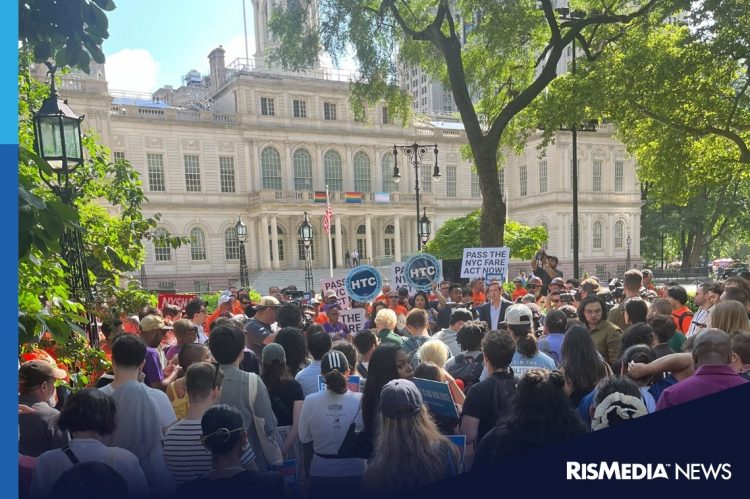Above, sides rally in front of NYC City Hall Wednesday. Photo by Jack Walsh.
NEW YORK CITY—Hundreds descended on City Hall in Manhattan Wednesday morning to protest or support a rental fee change currently being considered by the New York City Council that would shift who compensates brokers in the Big Apple, a long-debated change that advocates say will align New York with how commissions are paid in the rest of the country.
The bill, titled the Fairness in Apartment Rentals (FARE) Act, would transfer responsibility for paying the brokers’ fees to whoever hired the broker to be part of the rental transaction, essentially transferring broker fee responsibilities from tenants to landlords. New York City is one of only two places that allows landlords to charge tenants for brokers hired by the landlord.
Supporters of the bill argue brokers’ fees (often 10-15% of a tenant’s annual rent) burden tenants with a cost on a service they might not need due to sites like Zillow making apartment hunting a more self-directed process.
Those against the bill, which includes vocal opposition from the Real Estate Board of New York (REBNY), argue that the cost of brokers’ fees will be passed onto tenants in the form of higher rents. REBNY also says that the size and density of New York City necessitates the tenant-pays-brokers’ fees system (Boston is the only other large U.S. metro with a similar system), and that the solution to the city’s well-documented affordability crisis is to increase housing stock.
Local legislators have made multiple attempts to change the fee structure and prevent landlords from charging tenants for brokers they didn’t hire. A judge in 2021 struck down a rule that had temporarily ended the practice.
The current legislation, sponsored by New York City Councilman Chi Ossé, has 31 co-sponsors.
Prominent voices
Outside City Hall, activists on each side of the argument—primarily brokers and agents against, and tenants and some landlords in favor of the bill—were equally passionate about their cause. Agents expressed concern that they would be cut out entirely from the intricate rental process, while landlords claimed that rent simply increases due to local policy, inflation and the economy as a whole.
James Brennan, a New York-based real estate agent with the brokerage Bond, told RISMedia he opposed the passing of the FARE Act on the grounds that it will increase rents.
“To the public, (the bill makes it) sound like you don’t have to pay the brokers, right? So it sounds good,” Brennan says. “I didn’t realize that the landlord hikes up the rent if he’s going to pay the broker. So if you don’t know that, you don’t understand that the rents are going to increase.”
Brennan adds that he believes supporters of the bill haven’t thought through its effects.
“They’re not in the real estate business. I didn’t know that the landlord just raises the rent to pay me.”

After the hearing got underway in the chambers of the NYC City Council, a plethora of perspectives were shared, with more than 1,500 members of REBNY alone registered to make remarks during the public remarks section. The hearing initially ran from 10:00 a.m. to 3 p.m. that day, and after a recess, resumed for another 45 minutes from 3:45 p.m. to 4:30 p.m.
A panel of real estate leaders including Corcoran Group Chief Operating Officer Gary Malin, Brown Harris Stevens CEO Bess Freedman and Brian Phillips, associate broker at Douglas Elliman, opened the public comments. Sitting side-by-side, these three gave with successive speeches of prepared remarks before opening themselves up to questioning from the council.
Freedman said the FARE ACT, “threatens not only the livelihood of New York City real estate agents, but the tenants,” because “this bill would make fees hidden and progressive.” She also noted that many agents are also middle-income renters themselves, citing the average starting income of an NYC renter as $52,000 a year, and concluded, “housing is expensive because there’s not enough of it.”
However, the real estate industry’s opinion on the bill is not universal. Some brokers, such as Michael Corley of Corley Real Estate, have spoken in support of the FARE Act.
NYC Public Advocate Jumaane Williams, a supporter of the bill, commented during a round of questioning with Malin that, “There is no part of the industry that seems to want to do their part to fix the crisis,” and that “the profitability of housing is a major reason why we’re having a housing crisis right now.” Bill sponsor Ossé thanked both supporters and opponents of the bill for making their democratic voices heard in his opening remarks before addressing the “disingenuous and wrong” criticisms of his legislation.
He said should the FARE Act be passed, costs will not be passed onto renters due to the majority of New York apartments being rent-stabilized apartments, tenants gaining new bargaining power during lease renewals, and the fact that “rent is determined by market forces, not landlords.” He declared that his bill will fix a situation that is “bad for the economy, brutal for renters and just plain unfair.”
Markets and rates
The debate was waged not only in the hearing chambers, but outside City Hall.

Christopher Leon Johnson, a former insurance agent turned self employed videographer based in Brooklyn, showed up at the rally in opposition to the FARE Act. Johnson told RISMedia there is a lack of transparency when it comes to the bill’s effects and that he feels its primary supporters are not “regular people” who will be impacted.
“It is the leaders and (a) majority of the time, it’s all about political favors. It’s all about, ‘I scratch your back, you scratch my back.’ A lot of these, the people that are leaders, they actually pay the broker fees, they pay all that stuff. This is all about making sure that certain people don’t pay broker fees. It’s not about the regular people paying broker fees. If they actually read the bill, they wouldn’t support this.”
Michelle King, a broker affiliated with Corcoran Real Estate, echoes industry complaints about the legislation to RISMedia.

“Someone is doing this job (of showing apartments) and someone has to get paid for it. So they’re trying to say that, well, if the landlord hired the broker, then we shouldn’t have to pay, but the job still needs to be done. And if you’re not paying the broker fee, then the landlord will likely raise the rent so that they can pay the broker fee. It’s really as simple as that,” she said.
King adds that despite the rise of digital apartment hunting, brokers still have an important role to play in the process.
“There are many steps to renting an apartment, and you definitely want representation to help you negotiate. And even if the broker is only working for the landlord, you still need to be approved. And there’s a process for that and you want it to be done fairly. And brokers are an objective party that try to help both sides achieve a goal, a common goal, rent, apartments.”
David Nurse, a Brooklyn landlord who noted that “(he) represents the tenants also,” says he “sympathizes with both (sides).”
“In New York City, the tenant has to pay three ways. They have to pay the broker’s fee, the security in case they move out and one month rent. (The city) might just make some rules where they might make some of these agents a fixed fee. But that’s the main reason for the act, to curtail and keep rental expenditures down. We have a lot of people like students who can’t afford rent.”
Nurse also casted doubt on the criticism that the FARE Act is likely to result in higher rents across New York City. “What is causing rent to spike might be the increase in property tax or fees that the agents pay, (or) city regulations. But that broker’s fee is not a fee that’s going to cause rent to spike. It is just a one shot deal for the month. It is one time you have to pay that. That is not over the period of the lease. So I don’t think that it’s going to increase rents.”
Charles Tyrell, a Century 21 Achievers agent and landlord based in Brooklyn, also spoke in favor of passing the FARE Act to RISMedia, but has criticisms about the process thus far.
“The best thing to happen is these guys in the building over there (city hall politicians) have a conversation with tenants (and) landlords and homeowners, and not just take the tenants’ side, because as a landlord and homeowner, you have a responsibility.”
Follow RISMedia for continuing updates on this developing story and legislation.
To watch the hearing, visit the NYC City Council YouTube channel here.











